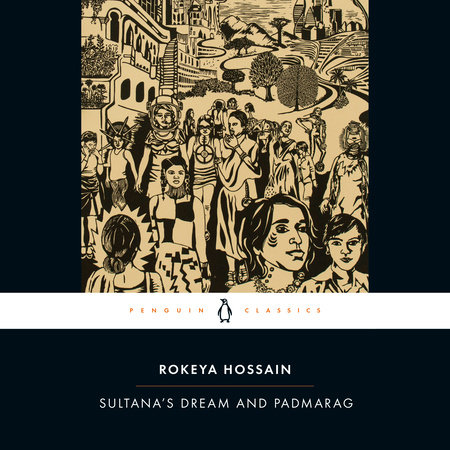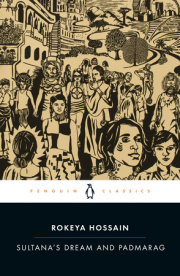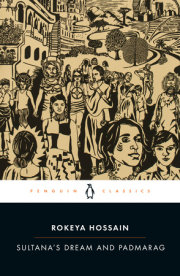One
Journey into the Unknown
When the train stopped at Naihati station at eleven p.m., a passenger dressed in English attire got off. Avoiding the crowd, he went toward the waiting room. Standing there, he gazed at the sights and beauty of the station. It seemed that he had not seen such a place or a station or a crowd ever before. That is why he was looking around him with eyes full of wonder.
Trains had to be changed here, if one wanted to go to Calcutta via Hooghly. There was time yet for the arrival of the train that would go to the various river ferries on the Hooghly. In the meantime, the passenger in question went down to the other end of the station. Some stationary trains stood there in a row. He began to pace up and down in the small patch of darkness created by the shadow of the trains. The row of trees nearby, the field of grass, all seemed to be bathed in the early autumn moonlight. But our traveler did not notice any of this. He was around eighteen or nineteen; his face was pale, deeply melancholy, but etched with tenderness. It seemed as if his heart would break. Although he was pacing, his feet barely seemed to move.
He was immersed in a deep sea of thought. Meanwhile, the train arrived and departed. Gradually, the lamps went off in ones and twos. He remained oblivious to it all. After a while, as though awakening from a dream, he went over to a station official and asked, "How long before the train leaves?" He learned that the train had left a long time ago. Moreover, there would be no other train going that night to the river ferries from which one could take a boat to Calcutta. The news struck him like a thunderbolt. He felt the world closing in on him and silently moved away.
He had been planning to go to Calcutta but could not. He would have to spend the night there. He was thinking: then what do I do? Where do I go? What should I do in Calcutta? Whom do I know there, after all? Whom can I go to, and what should I say?
One might ask: why go from Hooghly to Calcutta? It is possible to go directly from Naihati to Calcutta. Certainly, there must be a reason. This young man was in some kind of danger; so, he had disguised himself. Since he was escaping from danger in disguise, why would he go by the direct route? The enemy was following him. It might even be that the enemy was going with him to Calcutta. That was why he was waiting here, hoping to go to Hooghly.
Our traveler looked all around him with aching heart and wistful gaze. The pleasant early autumn skies, the sparkling garlands of stars, the soothingly beautiful creepers-none of these showed him any sympathy. Rather, the moon seemed to be mocking him because he had missed the train. He looked at the moon listlessly and seemed to say,
Cruel, heartless moon! Perched in the distant sky,
What are you watching? The sins and jealousies of the world?
You see me and want to laugh at me?
Your heart must be very hard
If seeing my sorrow, tears do not come to your eyes,
And you only laugh.
Why can I not laugh?
He who made me also made you;
While you smile divinely always,
Why do I languish in tears?
The sorrows and fears of the world are not your companions,
Sin and penance do not touch you;
Why then do they make me cry?
You go everywhere; do you face obstacles anywhere?
Does anyone say to you, "This is our room,
Do not come here, stranger!"
In the land of the blue sky, you float at will,
As if the endless sky is your home!
Why then, can I not find a refuge?
Two
Homeless
Walking absentmindedly along in this manner, the young man ended up some distance from the station. Although it was late, he was not overcome by drowsiness. Even the Goddess of Slumber, who relieves one of the burden of care and offers repose, is the companion of the happy man, not the sorrowful one. The traveler was careworn with anxiety, his main concern being to find shelter.
Now, with the night waning, the moon's radiance paled. A light veil of darkness hung over the earth. A constellation of stars gently lit up the expanse of sky. The young man was unaware of where he had ended up. The place was completely unfamiliar to him.
The melodious call to morning prayers from a mosque nearby awakened the silent earth, delighting and molding it into the rasa of devotion. Hearing that call, nature roused itself; all the birds awoke. The breeze carried the sound far, still further. That celestial sound was enough to make the traveler oblivious to the fatigue of having stayed up all night. I cannot describe what kind of joy he felt, since it can only be experienced; he who has experienced it, knows it.
Our traveler thought that it might not be a bad idea to go and seek shelter at the mosque. All he had with him was a handbag, so he would have no problem staying at the mosque for a couple of days. However, having arrived at the entrance to the mosque, he could not muster the courage to go in. What was wrong with him? He was weeping! No, he would not enter the mosque. He sat down helplessly by the road.
At that moment, three Brahmo women who were walking that way for reasons unknown stopped near the young man. With no shelter to retire to, the latter gathered up courage and rose to his feet. Greeting the three women, he asked, "Would you be kind enough to help me?"
The first lady replied: "Help? Tell us what sort of help you need; we shall try."
"Would you accommodate my sister for a couple of weeks? I have work to attend to elsewhere. There is no one at home. Please keep her for two weeks. Then I shall return and do whatever needs to be done."
The first lady: "We have no objections, but where do you live? Who are you? You don't know us at all. Yet, you wish to entrust your sister to us-what could you mean by this? Moreover, we, too, are travelers like you. We are going to Calcutta today itself. Try the house of one of the locals."
The traveler looked at them with sad, tired eyes and pleaded, "Please take pity on me and give me-no, my unmarried sister-shelter."
The three women conferred among themselves and said, "We would have taken your sister home, but we really are going to Calcutta today."
"She will also go to Calcutta with you. Please do allow me to take her to your home there. She will pay her own train fare."
The first lady (to her companions): "What do you think?"
The second lady: "Whatever you deem fit. I have no objections. But it isn't our own house-how can we suddenly take a strange woman there without informing Mrs. Sen about it beforehand? What do you say, Bibha?"
Bibha: "Well, my advice would be to leave for Calcutta today; we shall then explain the situation to Mrs. Sen and keep her mentally prepared." (To the traveler) "Go there tomorrow. Here-take this. Our address is written on this paper. It is not our own home-we are employees at Tarini School. Go there and take your sister along with you."
Three
Dina-Tarini, or The Savior of the Distressed
The distinguished lawyer, Tarinicharan Sen, had died young. He left behind no offspring; only his second wife, the young widow, Dina-Tarini, remained. For four years, she suffered from various ailments along with the trials of widowhood. Then, the city's reputed doctors attending to her gave up hope. But Dina-Tarini did not die.
Going against the wishes of her brothers-in-law, the older and the younger, and those of other relatives, Dina-Tarini set up a home for widows. She named it Tarini Bhavan. Encouraged by its success, she established a school and formed a society called the Society for the Upliftment of Downtrodden Women. Located at one end of the huge mansion housing Tarini Bhavan was the girls' school; at the other end stood the home for widows. But as time went by, Dina-Tarini also felt impelled to found a Home for the Ailing and the Needy next to it.
Having returned from death's door, Dina-Tarini received a fresh lease on life from the vast field of work stretching before her. Her relatives were not exactly pleased by the work she had dedicated her life to. In fact, they were quite unhappy about it, scorning her various activities and lamenting over the lakhs of rupees she was apparently squandering for this purpose.
Where would a widow find refuge, when she had no one in the world to turn to? In Tarini Bhavan. Where would a young orphan girl with no relatives be educated? At Tarini School. Where would a wife go, when she was forced to leave her marital home because of her husband's intolerable brutality? To the same Tarini Workshop.
Having thus been virtually ostracized by her own relatives, Dina-Tarini lived in seclusion. But to use the term "seclusion" would be misleading, because apart from the regular students (the day scholars), more than a hundred girls lived in the boardinghouse. Apart from them, there were the teachers and, of course, the matron and the maids. The number of people living in Tarini Bhavan was also not negligible. Tarini's relatives would remark, "Where will Tarini find people? Will any wife or daughter from a respectable family go anywhere near her? Every prostitute, every leper, and every worthless orphan is now a member of Tarini's extended family!"
Such comments failed to dishearten Tarini. Rather, they made her laugh. She would retort, "Is everyone given the honor of serving others?"
That evening, Dina-Tarini was very busy. A host of details pertaining to the school needed to be taken care of. She would have to serve as arbiter for the complaint that the collection-and-purchase clerk had, for some reason, beaten up the coachman. That afternoon, the female attendant who accompanied the schoolchildren traveling in Bus No. 5 had exclaimed, "Deary me! Never again will I escort a policeman's daughter home. The inspector said, 'I'll impound your bus, and toss your coachman into jail!'"
Tarini asked, "Why?"
"The horse is lame."
"Then tell him, 'Impound the horse and toss the syce into jail.'"
But that evening, a letter had arrived from the Society for the Prevention of Cruelty to Animals, stating that they would file a lawsuit against the school because the horses drawing Bus Nos. 3 and 5 limped. A charge of theft had been leveled against two syces for siphoning off the feed purchased for the horses. That afternoon, a wheel from Bus No. 7 had broken off after the vehicle collided with a tram. It was with such problems that Tarini was grappling when Miss Bibha Chakrabarti came in with the news that the unknown woman from Naihati had arrived.
Tarini said: "Keep her in Tarini Bhavan for tonight; I won't be able to make inquiries about her today. We can meet early tomorrow morning and discuss the subject. Please leave me alone now-I am terribly busy."
Four
Tarini Bhavan
Bibha escorted the stranger, Siddika, to Tarini Bhavan.
Usually, when people referred to Tarini Bhavan, they not only meant the house that was so named, but also the school, the workshop, and the Home for the Ailing and the Needy next to it. The school section, naturally, had Brahmo, Hindu, and Christian teachers. When the number of Muslim students increased, a couple of teachers were appointed to impart religious instruction to them. What commendable egalitarianism! Muslims, Christians, Brahmos, Hindus-all working in harmony, as though born from the same womb.
The school did without financial assistance from the government. It was, therefore, under no obligation to include in its curriculum any textbook featuring in the "government-approved" syllabus. Dina-Tarini selected the textbooks herself after consultations with highly learned women. The students were not branded, anyhow, with the mark of education as many universities were wont to do and turned into mere objects of luxury and pleasure. Science, Literature, Geography, Astronomy, History, Mathematics-all these subjects were taught, but the method of instruction was quite exceptional. The students were not forced to memorize misleading versions of history and end up despising themselves and their fellow Indians. Greater emphasis was laid on ethics, religious studies, and the inculcation of sound moral values. The girls were encouraged to grow up into good daughters, housewives, and mothers, inspired by high ideals, and to love their country and their religion more than life itself. Particular care was taken to ensure that they became self-reliant and not lifeless puppets, burdens on their fathers, brothers, husbands, or sons.
Only a select few in the whole country helped the school financially. Special care was taken to ensure that handouts were not accepted from the ruling aristocracy of native Indian states that had declared their allegiance to the British Empire.
The sick and the destitute were picked up from the streets and given shelter at the Home for the Ailing and the Needy. They left after they had recovered. Only the lepers and the physically disabled stayed on.
Many offered financial aid for the home. Several Muslim women offered donations anonymously. Such philanthropy was practiced in secret for fear that the divine grace earned by the act would be lost if the identity of the donors became common knowledge.
Most of the expenses of Tarini Bhavan were borne by the Society for the Upliftment of Downtrodden Women. Many Muslim women had become clandestine members of this society. Old women, impoverished widows, and ailing wives who were unfit for work lived in Tarini Bhavan.
In the workshop, all categories of women-spinsters, wives, and widows-were to be found. They were occupied in various kinds of work-sewing, spinning, weaving cloth on a loom, binding books, and preparing different types of sweetmeats and selling them. Some were given training that would make them eligible for a teaching job; some learned typing, while others trained to become nurses. To sum it up, the women belonging to this section earned their own living. It was here, too, that training was imparted to those who would become teachers at the Tarini Bhavan School and to nurses who would go on to work at the Home for the Ailing and the Needy. Moreover, women from this section were involved in other welfare work as well. They would, for example, distribute rice, clothes, and medicine and provide nursing care to people suffering the aftermath of famine, floods, and epidemics.
Copyright © 2022 by Rokeya Hossain. All rights reserved. No part of this excerpt may be reproduced or reprinted without permission in writing from the publisher.






